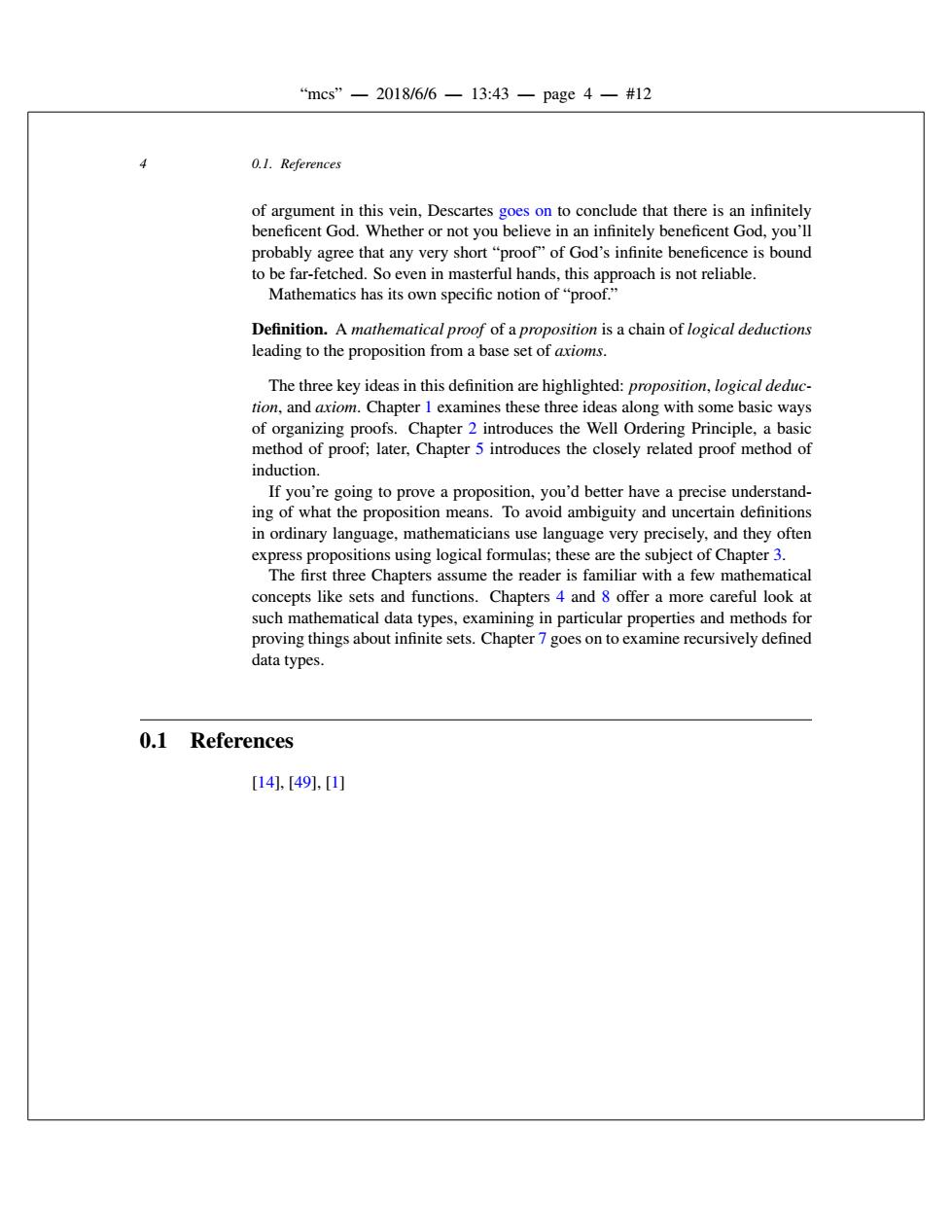正在加载图片...

“mcs”-2018/6/6一13:43一page4一#12 0.1.References of argument in this vein,Descartes goes on to conclude that there is an infinitely beneficent God.Whether or not you believe in an infinitely beneficent God,you'll probably agree that any very short"proof"of God's infinite beneficence is bound to be far-fetched.So even in masterful hands,this approach is not reliable. Mathematics has its own specific notion of "proof." Definition.A mathematical proof of a proposition is a chain of logical deductions leading to the proposition from a base set of axioms. The three key ideas in this definition are highlighted:proposition,logical deduc- tion,and axiom.Chapter 1 examines these three ideas along with some basic ways of organizing proofs.Chapter 2 introduces the Well Ordering Principle,a basic method of proof;later,Chapter 5 introduces the closely related proof method of induction. If you're going to prove a proposition,you'd better have a precise understand- ing of what the proposition means.To avoid ambiguity and uncertain definitions in ordinary language,mathematicians use language very precisely,and they often express propositions using logical formulas;these are the subject of Chapter 3. The first three Chapters assume the reader is familiar with a few mathematical concepts like sets and functions.Chapters 4 and 8 offer a more careful look at such mathematical data types,examining in particular properties and methods for proving things about infinite sets.Chapter 7 goes on to examine recursively defined data types. 0.1 References [141,[49],[1]“mcs” — 2018/6/6 — 13:43 — page 4 — #12 0.1. References4 of argument in this vein, Descartes goes on to conclude that there is an infinitely beneficent God. Whether or not you believe in an infinitely beneficent God, you’ll probably agree that any very short “proof” of God’s infinite beneficence is bound to be far-fetched. So even in masterful hands, this approach is not reliable. Mathematics has its own specific notion of “proof.” Definition. A mathematical proof of a proposition is a chain of logical deductions leading to the proposition from a base set of axioms. The three key ideas in this definition are highlighted: proposition, logical deduction, and axiom. Chapter 1 examines these three ideas along with some basic ways of organizing proofs. Chapter 2 introduces the Well Ordering Principle, a basic method of proof; later, Chapter 5 introduces the closely related proof method of induction. If you’re going to prove a proposition, you’d better have a precise understanding of what the proposition means. To avoid ambiguity and uncertain definitions in ordinary language, mathematicians use language very precisely, and they often express propositions using logical formulas; these are the subject of Chapter 3. The first three Chapters assume the reader is familiar with a few mathematical concepts like sets and functions. Chapters 4 and 8 offer a more careful look at such mathematical data types, examining in particular properties and methods for proving things about infinite sets. Chapter 7 goes on to examine recursively defined data types. 0.1 References [14], [49], [1]